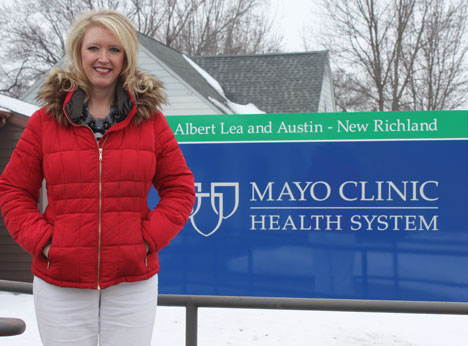
PRACTITIONER - The New Richland clinic welcomed Wendy Trihus as the new nurse practioner back in November to replace Allison Berg-Heinemann. (Star Eagle photo by Melanie Piltingsrud)
By MELANIE PILTINGSRUD
Contributing Writer
The New Richland Mayo Clinic has a new nurse practitioner. Wendy Trihus has been caring for patients there since November.
Trihus grew up in Northwood, Iowa, and now lives east of Geneva with her husband, John, who works as a custom farmer. Trihus was working at the Mayo Clinic branch in Wells when she was asked if she’d like to take the New Richland branch. “It was much closer to home,” she said.
Trihus started out studying general requirements at North Iowa Area Community College in Mason City, Iowa. Following that, she received a two-year nursing degree from Iowa Central Community College in Fort Dodge, and finished her bachelor’s degree in nursing at Briar Cliff in Sioux City, Iowa, a university with a Catholic Franciscan basis.
“In the beginning I was a nursing home nurse,” says Trihus, “and then I did some hospital nursing and home care nursing, and then I did public health visits.”
Having worked as a nurse for a number of years, Trihus decided it was time to work independently. She enrolled at Creighton University in Omaha, Neb., working as a home health nurse in Council Bluffs, and then switching to hospital nursing until she finished her degree in 2004.
“To be a nurse practitioner you need a minimum of a master’s degree,” Trihus explains, “and a lot of nurse practitioners now coming out of school have doctorate degrees.” So what’s the difference between a nurse practitioner and a doctor? “Philosophy is a lot of it, but we’re trained in a lot of the same specialties and practices.” Trihus says that years ago, when they first started doing physician’s assistant training versus nurse practitioner training, physician’s assistants started out under physician control, and nurse practitioners had their own training through a nursing school. Nurse practitioners had a holistic approach, believing that a person had a mind, a soul and a physical being. Physician’s assistants, according to Trihus, were trained with a greater emphasis on physical symptoms. “I would say now there’s not a lot of difference between P.A.s and nurse practitioners,” says Trihus. “The schooling is really similar [...], but, when you come down to the nitty gritty, nurses have these nursing theory classes and research and philosophy, and P.A.s still have some of that, but I don’t know if they have as much as we do. There are still pros and cons to being either/or.” While in school, nurse practitioners consider such things as whether the patient is a body with physical problems, or whether those problems might be a reflection of the soul.
Trihus learned a lot in her various roles as a nurse through the years. “When I did home health, I really enjoyed the relationships with people, and just kind of seeing them in their environment.” But in addition to that, Trihus says that sometimes seeing how someone lives can help explain why their health is the way it is; if they have poor care at home, they might have difficulty recovering from an infection or injury. She also noticed a big difference between how people lived in the big city versus a small town.
Of the New Richland position, Trihus says, “It’s family practice, so I see infants to elderly and everything in between.” Patients come with a variety of issues in New Richland – everything from simple things like sore throats to more complicated conditions. “If it’s something that’s more specialized and they need specialized care, then we’ll send them on [to a specialist],” says Trihus, “but the routine care of when people have chronic conditions, but they’re stable, we’ll see them.
“Mayo is nice, because you have access to specialists,” says Trihus. “It’s not always that they’ll answer your phone call and know who you are, but you have different ways to contact people and get responses without always having them see the patient right away.” Because the New Richland clinic is within the Mayo Clinic system, there are a lot of options, too, when Trihus needs to refer someone to a specialist. She can send patients to Rochester or Mankato, for example, wherever it’s convenient for them.
Trihus says she enjoys working at the New Richland Mayo Clinic, and hopes to be there for a good while to come.
